Premier Li Keqiang Meets the Press: Full Transcript of Questions and Answers
The Third Session of the 13th National People’s Congress held a press conference at the Great Hall of the People on the afternoon of 28 May 2020. Premier Li Keqiang met with Chinese and foreign reporters and answered their questions at the invitation of Spokesperson Mr. Zhang Yesui.
In his opening remarks, Premier Li Keqiang thanked the journalists for covering China’s NPC and CPPCC Sessions at an unusual time and despite unusual circumstances. He noted that although the containment protocols require that the press conference be held via a video link, such distance would not impede their communication. In the interest of time, he went straight to questions.
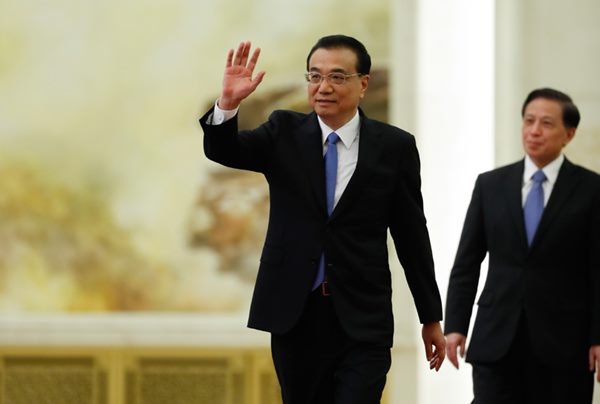
Premier Li Keqiang meets the press after the closing of the third session of the 13th National People's Congress at the Great Hall of the People in Beijing, capital of China, May 28, 2020. Premier Li took questions from Chinese and foreign reporters via video link. [Photo/Xinhua]
Reuters: The new coronavirus outbreak has devastated economies around the world. Trillions of dollars in fiscal and monetary measures have been pushed out to deal with the fallout. In this year’s Government Work Report, China did not set a GDP growth target. But it did announce fiscal measures worth about 4% of China’s GDP in 2019 according to our calculations. That’s slightly less than some economists expected after seeing China’s economy contract for the first time in decades in the first quarter. So my question is: can we expect China to deliver more ambitious stimulus in the months to come? Does China have sufficient policy options to deal with a prolonged global pandemic and rising tensions with the United States?
Premier Li: The novel coronavirus disease has taken a heavy toll on the global economy in a way rarely seen before. Major international institutions have projected a negative 3 percent global growth or worse this year. As China’s economy has become deeply integrated into the global economy, it is simply impossible for the Chinese economy to stay immune to such impacts. This year we decided not to set a specific growth target. This is a decision informed by the realities on the ground. In the meantime, we have formulated a series of goals and tasks in six key areas which are closely connected with economic development, with a particular focus on protecting employment, people’s basic living needs, and market entities.
Not setting a specific GDP growth target does not mean that economic development is not important. Our decision is designed for economic growth to deliver more real gains to our people and promote higher quality development in China. We believe that development still holds the key and is the foundation for resolving all the problems in China today. Putting protections in place in six key areas, especially in the areas of jobs, livelihoods and businesses, will help us achieve positive and solid growth this year to the extent possible, and maintain steady economic development.
In your questions you said our measures are seen by some as below expectations. What I heard from many quarters is that our measures are forceful. For any response to work, we must get both the timing and intensity right. When COVID-19 was still raging, some policies were introduced. But with the economy barely reopened, the situation then made it difficult for these policies to get truly delivered on the ground, as most of the people still had to stay indoors. This has been a process of gaining experience. Based on the experience in the past weeks and months and our assessment of the current situation, we have decided on new policy steps of a sizable scale as set out in the Government Work Report, and we believe these measures are forceful.
We have repeatedly said that we will not flood China’s economy with liquidity. We didn’t do it in the past; we will not do it now. But the current unusual time requires extraordinary measures. Just as water is important to fish farming, sufficient liquidity is important to economic development. But too much water will induce froth in the fish pond, whereby some people may attempt to muddy the waters and fish for arbitrage. We must ensure that measures taken are well-focused, the prescription is precise and the medicines for getting out of the hardship effective. New approaches must be employed as to where the money comes from and how it is spent.
The financing raised through policies of a sizable scale can be grouped into mainly two categories. The first covers the increase of fiscal deficits and issuance of government bonds for COVID-19 control. Together it amounts to 2 trillion RMB yuan. The other category, which is roughly twice as big, covers payment relief for enterprises of their contributions to social security schemes, also known as payroll tax in some other countries, and taps into the balance of the unemployment insurance fund, interest concessions made by state-owned commercial banks, and price reductions in natural monopoly industries to lower enterprises’ operating costs. This money will be primarily used to support jobs, people’s basic living needs and businesses, and sustain household income. It accounts for a double-digit share in the more than 40 trillion RMB yuan of total household income in China.
What’s more important is how the money is spent. Our measures of a sizable scale are designed to provide vital relief to businesses and revitalize the market. With a particular focus on supporting jobs and people’s livelihoods, our people will have money to spend and consumption will drive market vitality. This is in keeping with market-oriented reform.
Money well-spent can create new money. Money invested in the people will generate new wealth, help us protect and preserve the tax base and make public finance more sustainable. We will do our utmost to keep China’s economic growth stable and make steady progress. In other words, we will not kick up dirt and leave a trail of dust that will block the sight of those who follow. We have also reserved policy space on the fiscal, financial, social security and other fronts. And we are in a strong position to quickly introduce new measures without any hesitation should the evolving situation calls for it. It is essential that we keep China’s economic growth on a steady course.
I am confident that under the strong leadership of the CPC Central Committee with Comrade Xi Jinping at its core and with joint efforts of people across the nation, we will be able to prevail over the current difficulties, fulfill our tasks and goals for the whole year, and complete the building of a moderately prosperous society in all respects. Keeping China’s economic growth and fundamentals stable will be a contribution to the whole world. And China will remain a positive force driving global economic recovery and growth.
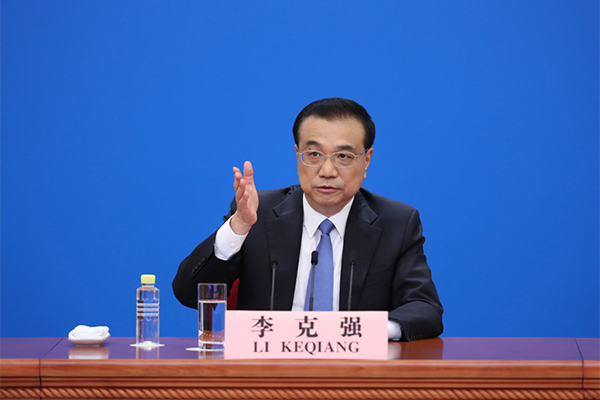
Premier Li Keqiang meets the press after the closing of the third session of the 13th National People's Congress at the Great Hall of the People in Beijing, capital of China, May 28, 2020. Premier Li took questions from Chinese and foreign reporters via video link. [Photo/Xinhua]
Bloomberg News: The origins of COVID-19 are still a mystery. Scientists think if we can find out where it came from, we could prevent future pandemics. There have been calls for an international independent inquiry into the origins. What is China’s stance on how such an inquiry should be carried out? What should such an inquiry do and what should it not do?
Premier Li: China and many countries believe that it is important to get a clear idea about the sources of the coronavirus. At the recently held World Health Assembly, a resolution was adopted, and China is one of the co-sponsors of this resolution. We believe that getting clear about the sources of the virus on the basis of science will help us better carry out containment of COVID-19, and also contribute to protecting life and health of people around the world.
The novel coronavirus disease has caught all countries by surprise. It is a completely new disease to humankind. So far, I’m afraid there is still more to the virus that we do not yet know. Viruses respect no borders, and they are the common enemy of the whole world and entire humanity. Nowadays, all countries are still working hard to contain the spread of the virus, and we are gaining experience along the way. We must work together to keep the virus in check. Research efforts need to be intensified for breakthroughs in vaccines, effective medicines and testing reagents, as they will be powerful weapons to help us succeed in checking the virus. China and many other countries are making investments into R&D of these products, and we are open to international cooperation. The deliverables of the R&D will be global public goods that we are ready to share with others. They will help the entire humankind in defeating the virus.
With painstaking efforts, the Chinese people have successfully brought the spread of the virus under control. And China has taken an active part in international cooperation against the virus. We have all along acted with openness, transparency and a sense of responsibility. We have shared information in a timely way with the rest of the international community. The virus is still spreading around the world. And in China it has not come to a complete end yet; there are still sporadic cases. Scientists have cautioned us to stay on high alert to prevent a resurgence of infections. We must continue to adopt a factual, science-based, open and transparent approach in dealing with COVID-19. Any infection, once detected, must be promptly handled, and no cover-up will ever be allowed.
Many people say that COVID-19 will not come to a stop any time soon and we may have to live with it for quite some time to come. All countries now are confronted with dual challenges. It’s like doing double exams. We have to contain the spread of the virus, and at the same time do our best to get life and work back to normal. I’m afraid there is a certain level of trade-off between these two goals. Things would be quite different if we had only one task. So we will have to do our utmost to strike a delicate balance and continue to explore our way forward. In this process, international cooperation is vitally important. Whether it’s fighting the virus or growing the economy, we must come together in a sense of partnership to eventually fight back the onslaught of the epidemic.
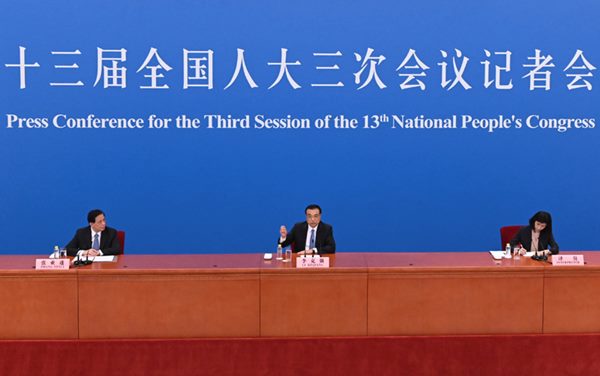
Premier Li Keqiang meets the press after the closing of the third session of the 13th National People's Congress at the Great Hall of the People in Beijing, capital of China, May 28, 2020. Premier Li took questions from Chinese and foreign reporters via video link. [Photo/Xinhua]
CCTV: In the Government Work Report, this year’s economic policies have been spelled out. What will the government do to ensure that all these funds will be truly delivered to benefit companies, instead of just circulating within the financial sector, and bring real gains to the general public?
Premier Li: In coping with the current round of unprecedented shocks, we don’t have ready experience to draw from. It’s not something we can manage with ease, and we will have to blaze a trail with hard efforts. We must be creative in crafting and delivering our policies. As I said just now, our policies, which are of a sizable scale, are designed to provide vital relief to businesses and revitalize the market, with particular focus on stabilizing employment and ensuring people’s livelihood. They are not focused on large infrastructure projects. This is because big changes have taken place in China’s economic structure, where consumption is now the primary engine driving growth, and micro, small and medium-sized companies now provide over 90 percent of all jobs in China. So under the sizable-scale policies introduced this time, some 70 percent of the funds will be used to support the increase in people’s income through direct or relatively direct means in order to spur consumption and energize the market. One big challenge we have confronted in coping with COVID-19 is that containment efforts have had a dampening effect on consumption. Hence, measures in this direction are also part of our market-oriented reform.
Second, the funds made available will all be used to support primary-level governments and businesses, and ensure people’s livelihood. The increase of budget deficits and funds raised from the issuance of government bonds for COVID-19 control will all be channeled to primary-level governments. Even provincial governments will be just passers-by to these funds. Some people may ask whether primary-level governments can ensure all the funds will be put to best use. In this respect, a special transfer payment mechanism will be established to see that companies, especially smaller firms, will truly benefit from these funds, and people who live on social security schemes, subsistence allowance, unemployment benefits, old-age support and those living in difficulties will be able to benefit. Real-name records will be established, and no cooking of books or embezzlement will ever be allowed. We will keep our eyes wide open and welcome public supervision. Eventually, the delivery of these measures will have to be recognized by businesses and our people.
The Central Government will lead by example in living on a tight budget. We will cut over 50 percent of outlays on non-essential, non-obligatory expenditures at the central government level, and the money saved will be mainly used to support primary-level governments, enterprises and people’s basic living needs. Governments at all levels must tighten their belts, and reject pointless formalities and spending splurges.
Just now, I talked more about boosting consumption. That doesn’t mean investment is not important. We will also expand effective investment. There will be an increase of 1.6 trillion RMB yuan of special local government bonds this year, and some treasury bonds as well, with the total amount topping 2 trillion RMB yuan. They account for between 20 and 30 percent of the funds made available under the sizable-scale policies we introduced this year. The focus of the funds will be on new infrastructures and new-type urbanization and key projects for national development. We will rely on reforms in undertaking these programs and mobilize private sector investment. And the projects supported must generate good returns, and be well-calibrated and delivered according to economic laws to avoid undesirable results.
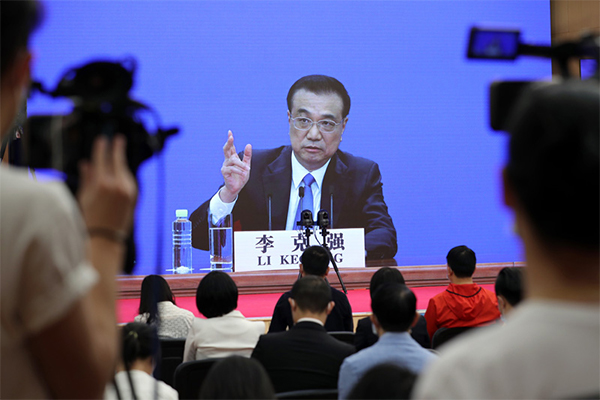
Premier Li Keqiang meets the press after the closing of the third session of the 13th National People's Congress at the Great Hall of the People in Beijing, capital of China, May 28, 2020. Premier Li took questions from Chinese and foreign reporters via video link. [Photo/Xinhua]
China Times: Because of COVID-19, the Two Sessions this year have been postponed to May, which is quite close to the date of 20 May. As the DPP continues to govern in Taiwan, what is the overall consideration of the mainland concerning its policy toward Taiwan? And what will the mainland do to promote relations across the Taiwan Strait?
Premier Li: As I said in the Government Work Report, our principles and policies toward Taiwan have been consistent and well-known to the international community. We will stay committed to the one-China principle and the 1992 Consensus. We will continue to firmly oppose “Taiwan independence”. Based on this political foundation, we are ready to have dialogue and consultation with any party, group or personage in Taiwan regarding cross-Strait relations and the future of the Chinese nation, and promote peaceful growth of cross-Strait relations. We will continue to show maximum sincerity and do our very utmost to promote peaceful reunification of China. The Taiwan question is China’s internal affair. And we have all along opposed external interference. The Chinese nation has the wisdom and the ability to handle its own affairs.
We view our fellow compatriots in Taiwan as brothers and sisters. Blood is thicker than water. We will continue to pay high attention to their well-being. Thanks to our joint efforts, there has been no loss of life to COVID-19 among Taiwan compatriots working and living on the mainland. In the face of the epidemic, we wish people on both sides of the Taiwan Strait safety and good health.
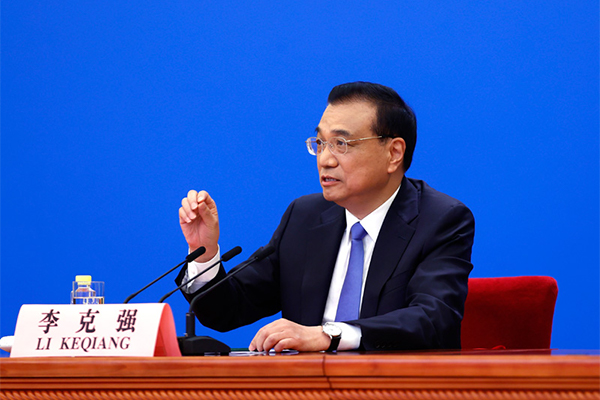
Premier Li Keqiang meets the press after the closing of the third session of the 13th National People's Congress at the Great Hall of the People in Beijing, capital of China, May 28, 2020. Premier Li took questions from Chinese and foreign reporters via video link. [Photo/Xinhua]
China Daily: In this year’s Government Work Report, the target of new urban jobs has been revised downward, and the target of surveyed urban unemployment rate upward, compared with the levels last year. In the face of the severe employment situation, what will the government do to avert massive job losses and help college graduates and rural migrant workers find jobs?
Premier Li: We have set this year’s target of new urban jobs at over 9 million, somewhat below last year’s level. To attain this goal, we need to maintain a certain level of economic growth. The urban surveyed unemployment rate target is set at around 6 percent. In fact, in April, that figure already hit 6 percent, so such a target was set on the basis of the situation on the ground.
Employment matters the most in people’s lives. It is something of paramount importance for all families. Of all the comments posted by netizens on the Chinese government portal website, some one third are about jobs. One of them was posted by a rural migrant worker in his 50s. He said that over the past 30 plus years, he had been working in cities every year. But so far this year he has been unable to find a job and the whole family is now in difficulty. Many self-employed individuals have seen their businesses grinding to a halt for several months. And some export companies have also been in great difficulty for lack of orders. This is affecting the jobs of their employees. We must provide support to all these people. But most importantly, we must help them land jobs. There is a labor force of 900 million in China. If they are out of work, there will be 900 million mouths to feed; if they are all put to work, 900 million pairs of hands will be able to generate tremendous wealth.
In order to retain existing jobs, all our pro-job measures will be fully employed with the largest input of funds. Such sizable policy funds can be used by primary-level governments to implement tax and fee cuts, and subsidize rents or interest payment in support of companies. So all these measures are designed to keep companies in business and secure the jobs of their employees and they will be implemented in a fair and reasonable way. We will also finance skills training initiatives by businesses to stabilize employment. This year and the next, we will tap into the balance of the unemployment insurance fund to provide some 35 million vocational skills training opportunities. This will cushion the impact of unemployment, and we will help people who lose their jobs get reemployed as soon as possible.
We also need to do our best to create new jobs. Nowadays, some 100 million people are employed in new forms of business and industry, and some 200 million people are working in the gig economy. The government must continue to provide support and at the same time lift all unwarranted restrictions that prevent the development of those industries and sectors. We also need to create a favorable environment for the increase of new job opportunities. Last year, more than 10,000 new businesses were created on an average day, and we will continue to work hard to see that the figure stays at this level this year.
We can certainly rely on the innovation and initiative of the Chinese people in this respect. One may recall when young people returned to the cities from the countryside in large numbers in the early days of reform and opening-up, the opening of roadside tea stands helped to put many of them to work. About two weeks ago, I saw in the news that a city in China’s western region, in keeping with local rules and regulations, set up 36,000 mobile stalls, adding some 100,000 new jobs overnight.
Our people are hardworking and the Chinese market keeps expanding and upgrading. In this process, the government must focus on providing support to key groups in their employment. The number of new college graduates will reach a record high of 8.74 million this year. We must provide employment services to these people, both this year and next, so that they will not be left to their own devices. And for rural migrant workers, no matter whether they are still working in a city or have returned to their hometown, we will put in place employment service platforms to support them in landing jobs. We must also fully implement all the support measures for demobilized military personnel as well.
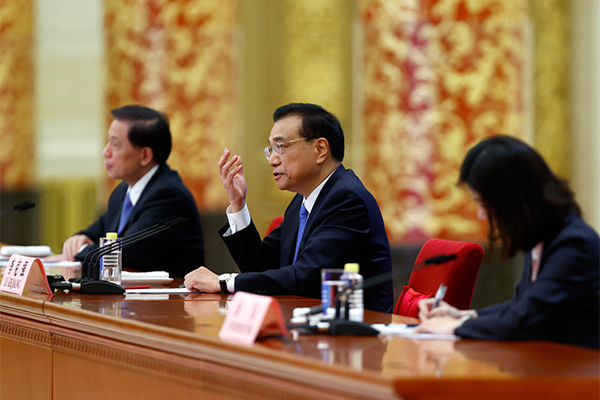
Premier Li Keqiang meets the press after the closing of the third session of the 13th National People's Congress at the Great Hall of the People in Beijing, capital of China, May 28, 2020. Premier Li took questions from Chinese and foreign reporters via video link. [Photo/Xinhua]
Phoenix TV: At this year’s NPC Session, a decision was adopted on establishing and improving the legal system and enforcement mechanisms for safeguarding national security in the Hong Kong SAR. The Standing Committee of the NPC will also set in motion a legislative process in this respect. Does this mean that the Central Government has adjusted its policy toward Hong Kong and abandoned “one country, two systems”? How do you respond to the various comments in this respect?
Premier Li: “One country, two systems” is China’s basic state policy. The Central Government has all along fully and faithfully implemented the “one country, two systems” under which the people of Hong Kong administer Hong Kong with a high degree of autonomy, acted in strict accordance with the Constitution and the Basic Law, and supported the Hong Kong SAR government and the Chief Executive in exercising administration according to law. The decision adopted at the NPC Session to safeguard national security is designed for the steady implementation of “one country, two systems” and for Hong Kong’s long-term prosperity and stability.
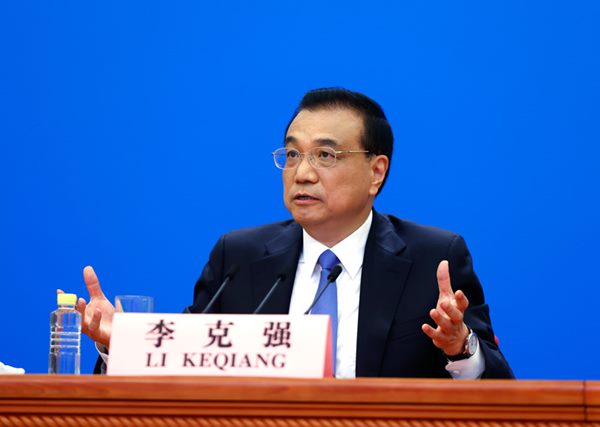
Premier Li Keqiang meets the press after the closing of the third session of the 13th National People's Congress at the Great Hall of the People in Beijing, capital of China, May 28, 2020. Premier Li took questions from Chinese and foreign reporters via video link. [Photo/Xinhua]
NBC News: The United States continues to blame China for the global pandemic. There’s more and more talk of a cold war between the US and China. At the same time, Chinese and American officials talk of creating favorable conditions for the phase one trade deal that could help stabilize the relationship. Are you still confident that more economic reforms and concessions of China can adequately address America’s concerns, given that China’s economy has been weakened? Or if the efforts for cooperation fail, can China’s economy withstand the threat of a “cold war” and “decoupling”?
Premier Li: It is true that at the moment, China-US relations have encountered some new problems and challenges. This is a very important bilateral relationship. Both countries are permanent members of the UN Security Council. There are many areas where the two countries can and should work with each other in tackling both traditional and non-traditional challenges. There are also extensive exchanges between the two countries in the economic, trade, scientific, technological, cultural and other fields. So it is fair to say that there is extensive common interest between China and the United States. Both countries stand to gain from cooperation and lose from confrontation. Getting Sino-US relationship right is in the interest of people of both countries and the whole world. Given the importance of this relationship, the problems that occurred in this relationship have been a cause for concern for the international community. As for a cold war, you know that we have all along rejected the “cold war” mentality. And “decoupling” between major economies will do neither side any good. It is also harmful to the world. I believe we should continue to work together to follow through on the important consensus reached between our two presidents and work jointly to foster a Sino-US relationship based on coordination, cooperation and stability.
The economies of our two countries have become closely interconnected. Our economic and trade ties have come a long way, and both sides have benefited tremendously. Just a few days ago, an American high-tech firm announced the launch of an investment project in Wuhan. I shouldn’t do any commercial promotion for any company, but I highly appreciate this move and sent my message of congratulations to mark the occasion. I believe this example shows that the business communities of our two countries need each other, and our business cooperation can be of mutual benefit.
I believe the economic cooperation and trade between our two countries should follow commercial principles. We should leave the decisions to the market and to the business leaders. The job of the government is to establish platforms for the business communities of the two countries. China and the United States are the world’s largest developing and developed countries respectively. Given the differences in our social systems, cultural heritage and historical backgrounds, some disagreements and even frictions may be unavoidable. What’s important is how we manage them. The relationship has been moving forward amid twists and turns in the past several decades, featuring both growing cooperation and some bumps along the way. Indeed, this is a complex relationship. We must use our wisdom to expand common interests and manage differences and disagreements. In a word, I believe that the two countries should develop a relationship on the basis of mutual respect, equality and mutual benefit, respect each other’s core interests and major concerns, and embrace cooperation. That will be conducive to the interests of both countries and the world.
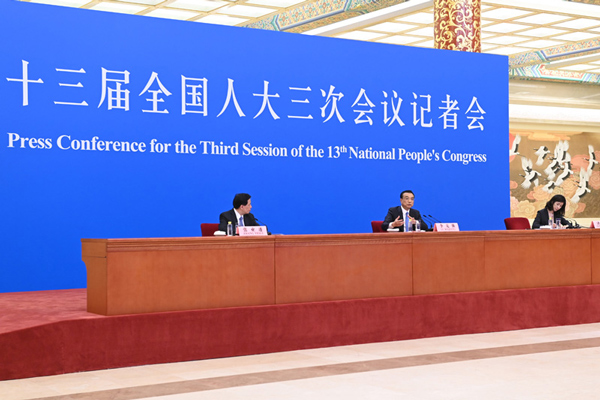
Premier Li Keqiang meets the press after the closing of the third session of the 13th National People's Congress at the Great Hall of the People in Beijing, capital of China, May 28, 2020. Premier Li took questions from Chinese and foreign reporters via video link. [Photo/Xinhua]
Xinhua News Agency: When we talk about the economic work agenda for the Chinese government this year, the words we have heard most frequently are stability and protections. What are their relations with market-oriented reforms? What will be the priorities of reform this year?
Premier Li: Our experience in the past 40-plus years of reform and opening-up shows that the greater difficulty we face, the more important it is for us to keep to reform. In our macro policies, we outlined sets of priority areas where stability is key and where protections are needed. Our measures are designed to help those vast numbers of market entities and are built around addressing their difficulties and concerns. This in itself is consistent with our market-oriented reform.
First and foremost, we must help all our businesses survive. Our solid measures must serve to provide vital relief to businesses and revitalize the market. Hence, all these measures must deliver real gains to companies and support self-employed individuals. As I said in the Government Work Report, we must do our utmost to help the 120 million market entities in China sustain themselves, and that will help us assure success for the future.
At the same time we must work hard to help our businesses thrive by pressing ahead with reform of government functions. We will continue to foster a market-oriented and world-class business environment governed by a sound legal framework. The government must lift all unnecessary restrictions on market entities to facilitate fair competition. Such policies and measures, intangible as they are, will create tangible wealth in our businesses just like real investments.
Furthermore, we must work hard to help more new market entities emerge. We have seen a trend-bucking surge of growth in new forms of business and industry during the COVID-19 response, including online shopping, express delivery services, and teleworking. Some new forms of business have even seen their revenues increase by two thirds. I believe such developments are very much attributable to our initiatives and reforms in recent years, including the supply-side structural reform, our efforts to promote high-quality development and foster new drivers of growth, and our initiative of encouraging business start-ups and innovation. We must use the experience gained in this process to the fullest extent to foster more growth drivers and help more market entities grow. This year, our goal is to see that the number of newly registered businesses stay at about 20,000 on an average day. And that figure has become an important indicator gauging the economic vitality of China.
We pay close attention to these smaller firms, but we also highly value the role of big companies. We hope that companies of all sizes will be able to thrive together through close cooperation and collaboration. We also expect that more smaller firms will one day grow into large companies. This year,we must ensure full delivery of all these relief and support measures, and at the same time work for notable improvement in China’s business environment. These measures, when combined, will produce multiplying effects.
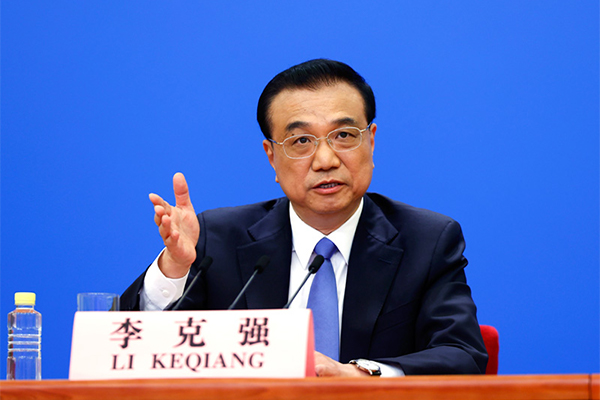
Premier Li Keqiang meets the press after the closing of the third session of the 13th National People's Congress at the Great Hall of the People in Beijing, capital of China, May 28, 2020. Premier Li took questions from Chinese and foreign reporters via video link. [Photo/Xinhua]
Asahi Shimbun: COVID-19 has taken a big hit on the global economy. But China has been successful in bringing the spread of the virus under control. What does China plan to do to advance economic cooperation with Japan and other neighboring countries? What is China’s plan for advancing the FTA among China, Japan and the Republic of Korea, the Regional Comprehensive Economic Partnership (RCEP) and other free trade arrangements? Does China have a plan to join the TPP?
Premier Li: I recall that last year at the leaders’ meeting of East Asian cooperation, leaders of 15 countries made the commitment of signing the RCEP by the end of this year. I hope and believe that this commitment will not come to nothing. China, Japan and the ROK are also working closely together to advance their FTA development. The three countries are close neighbors, and we would like to work with the other two countries to develop a mini economic cycle within the bigger economic cycle. For example, recently China and the ROK have opened a fast-track service for personnel inter-flows in areas such as commerce and technology. We believe this will benefit the resumption of economic activities, and our geographical proximity has put us in a good position to benefit from this earlier.
As for your question about TPP, I suppose what you mean is the Comprehensive and Progressive Agreement for Trans-Pacific Partnership (CPTPP). China has a positive and open attitude toward joining the CPTPP.
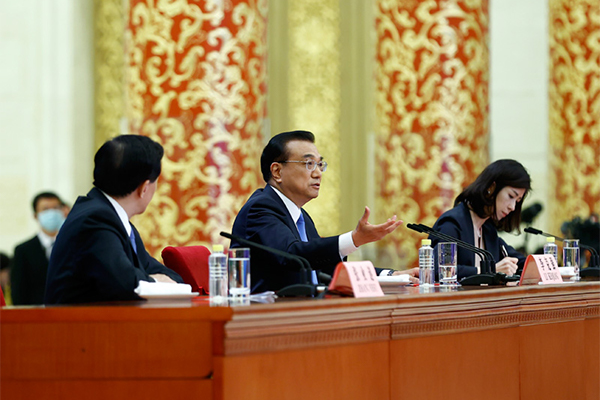
Premier Li Keqiang meets the press after the closing of the third session of the 13th National People's Congress at the Great Hall of the People in Beijing, capital of China, May 28, 2020. Premier Li took questions from Chinese and foreign reporters via video link. [Photo/Xinhua]
People’s Daily: This year, China plans to win its battle against poverty. But because of COVID-19, many families have seen a decline in their household income. And some are even at the risk of falling back into poverty. So are we able to fulfill the task of winning the battle against poverty this year? And what will the government do to meet people’s essential needs?
Premier Li: Our country is a developing country with a big population. The per capita annual disposable income in China is 30,000 RMB yuan. But there are still some 600 million people earning a medium or low income, or even less. Their monthly income is barely 1,000 RMB yuan. It’s not even enough to rent a room in a medium Chinese city. And because of COVID-19, many families have encountered difficulties. So it is a very high priority on the government’s work agenda to meet the essential needs of vulnerable groups and those families who have encountered new difficulties because of COVID-19. This is a very important part of the government’s work agenda. And a fairly big part of our support policies are designed for this very purpose.
This year, we are determined to end poverty as scheduled. This is a serious commitment made by the CPC Central Committee with Comrade Xi Jinping at its core to the whole of Chinese society. Before COVID-19 struck, there were some 5 million people living below the poverty line. But because of the disease, some may have fallen back into poverty. Hence we now face a greater task in meeting our goal. But with our multi-pronged policies and measures to ensure the essential needs of our people, we have the confidence to win the battle against poverty this year.
Governments at all levels must always put people’s interests first and bear in mind the hardships of the Chinese people. In introducing each and every policy, we must make sure that it contributes to the well-being of all families and to the better lives of our people. In responding to COVID-19 this year, we must make thoughtful and meticulous plans to ensure the basic needs of all vulnerable groups. In this respect, we have decided to expand the coverage of subsistence allowance and unemployment benefits. Some 60 million people in China still live on subsistence allowance or receive unemployment benefits, penury assistance, or other relief or support. This year, we are expected to see a big increase in the number of recipients. We have sufficient funds to support these vulnerable groups. We must use the money wisely to ensure that every cent will be well spent. Some 300 million senior Chinese citizens live on old-age pension. We decided to raise the pensions for these retirees this year. We must fully deliver all our commitments.
Actions count, and actions always speak louder than words. We have sufficient balance in our social security fund to ensure that pension benefits will be paid on time and in full, and there should be no loopholes in the operation of the fund. This way, we will be able to give our people more hope about their future. More importantly, the Chinese have a tradition of respecting and taking good care of the elderly. We must ensure that all the benefits and support will be duly provided. This will reassure our people and also help us promote China’s economic development. As the saying goes, the people is the foundation of a state. When the foundation is strong, the state will be secure. So we must fully deliver on all those policies and measures. And that will make our people more hopeful about their future.
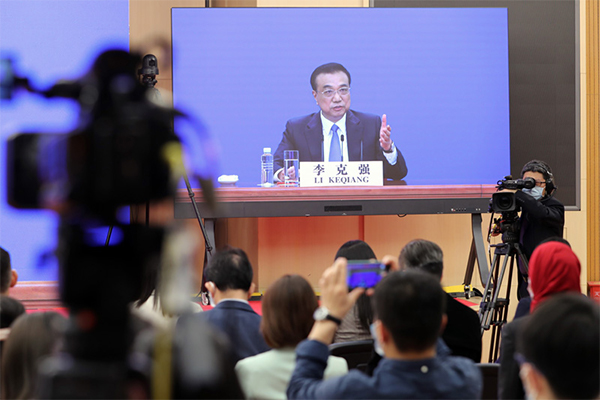
Premier Li Keqiang meets the press after the closing of the third session of the 13th National People's Congress at the Great Hall of the People in Beijing, capital of China, May 28, 2020. Premier Li took questions from Chinese and foreign reporters via video link. [Photo/Xinhua]
Lianhe Zaobao: In the Government Work Report, you said that China will face some factors that are difficult to predict in its development due to the great uncertainty regarding the COVID-19 pandemic and world economic and trade environment. So what is your reading of the external situation China faces? What will China do to cope with the changes in the international environment? And what role will China play in the global responses to the public health challenge and the challenge of serious global recession?
Premier Li: Let’s look at what’s happening around us. COVID-19 has impacted our world profoundly. There has been a significant deceleration and decline of exchanges and cooperation between countries because of the containment requirements. Should such a trend continue, the global economy will be pushed into deeper recession and that is something dangerous. And if the world economy cannot resume growth, it may be even challenging to sustain the COVID-19 response. In responding to COVID-19, we need public goods more than ever before; we need to keep the international industrial and supply chains stable. This requires even greater openness and the pursuit of trade liberalization and investment facilitation. With such joint efforts we will be able to prevail over and minimize the effects of COVID-19 on the world.
It is impossible for any country to achieve development with its door closed or retreat back to the agrarian times. China will keep to its opening-up policy. China will not waver in this commitment, nor is it possible for us to shut our door to the outside world. Instead, we will further expand our cooperation with the rest of the world and introduce more opening-up measures on our own initiative.
Openness is as indispensable to a country’s development as air is to human beings. One will suffocate in an enclosed space. We, in this process, will work with others to keep global industrial and supply chains stable. Some have made plain their intention to readjust the global industrial and supply chains. We believe the shifts in global production of businesses should be done in accordance with market principles. In the marketplace, it is only natural for companies to come and go, succeed or fail. People should not make arbitrary plans against market rules. Instead, we should open up our markets wider to each other.
In an environment of mutual openness, we believe it’s important for countries to live side by side in amity. We hope that all countries will observe the principles of mutual respect and equality. We believe that all countries should be equals, big or small, rich or poor, strong or weak. And if there are some rules in today’s world that need to be improved, we can all sit down and work things out through discussions. We need to pursue mutual benefit in our cooperation. We don’t think for any one particular party to take all the benefits will work. Instead, we should pursue win-win. And in this environment we may achieve shared success. Countries should also support, help and learn from each other, as we can make the most of our comparative advantages. We believe all countries should fulfill their due international obligations and work together to tackle common challenges and difficulties. And China, as a large developing country, will surely live up to its share of international responsibilities.
China is a huge market. All these policies of a sizable scale that we have introduced to provide relief to businesses will further spur consumption and energize our market. And we hope that people will stay optimistic about coming to invest in this big market of China. China is also prepared to boost imports from other parts of the world and we will be a big market for the whole world.
As for how to respond to the public health crisis and global economic recession, as I have said in my previous remarks, we believe all members of the global community should pull together in a sense of partnership to prevail over the current difficulty. We hope and believe that with joint efforts of people around the world, the post-COVID-19 world will be a more open one. And this post-recession world will embrace new prosperity.
The Press Conference was held via a video link between the main venue, the Golden Hall on the third floor of the Great Hall of the People, and the Press Center for the NPC and CPPCC Sessions at Media Center Hotel. It lasted for about 110 minutes.










